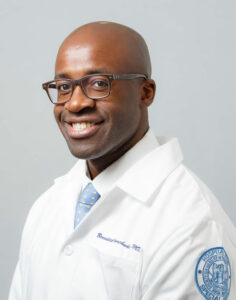Articular Cartilage Restoration Surgeon

Articular cartilage can be damaged or injured from from a traumatic event or normal wear and tear. Over time, the damaged tissue can wear down to the bone and create a painful condition called osteoarthritis. Articular cartilage restoration surgeon Doctor Benedict Nwachukwu provides diagnosis as well as surgical and nonsurgical treatment options for patients in Manhattan, New York City, NY who have sustained an articular cartilage injury. Contact Dr. Nwachukwu’s team today!
What is articular cartilage restoration?
The articular cartilage in the knee is the smooth, shiny white tissue that covers the ends of the bones where they come together to form the knee joint. Articular cartilage supports a healthy knee, making it easier to move as it allows the bones to glide over each other in a pain-free, smooth motion. Articular cartilage can be damaged or injured from normal wear and tear, or from a traumatic event. Over time, the damaged tissue can wear down to the bone and create a painful condition called osteoarthritis. Articular cartilage restoration uses surgical techniques to stimulate the growth of new cartilage which can relieve pain and allow better function in the knee joint. Dr. Benedict Nwachukwu, orthopedic knee surgeon serving patients in Manhattan, New York City and the surrounding New York boroughs offers articular cartilage restoration and other surgical techniques to help relieve knee pain and the symptoms associated with osteoarthritis.
Who should have articular cartilage restoration?
Articular cartilage restoration techniques vary and depend greatly on the defect, size and location of the cartilage damage. Dr. Nwachukwu will also take into account the patient’s age, activity level and goals after restoration. Small articular cartilage defects can be treated with conservative measures such as rest, NSADs (non-steroidal anti-inflammatory drugs) and physical therapy. If, however, the articular cartilage has a large defect, or if non-surgical measures have failed to alleviate painful symptoms, Dr. Nwachukwu will recommend articular cartilage restoration.
Most candidates in New York who would benefit from articular cartilage restoration are adults with a single cartilage injury, or lesion. Patients with many lesions in articular cartilage are less likely to benefit from the surgical restoration, however these decisions are made on an individualized basis after consultation with Dr. Nwachukwu.
How is articular cartilage restoration done?
Articular cartilage restoration should not be done by anyone but a highly skilled orthopedic knee surgeon like Dr. Nwachukwu. The restoration techniques are highly individualized and tailored to each patient’s specific cartilage defect or injury. Dr. Nwachukwu has extensive experience in treating articular cartilage defects and damage in the knee. The restoration techniques he may use include:
- Microfracture: The goal of microfracture is to stimulate new cartilage growth by creating a new blood supply. During this procedure, a sharp tool, called an awl is used to make holes in the bone. This causes the bone to “bleed” which creates a natural healing response. The cells from the blood fill the area of damaged cartilage and create a “patch” which hardens into new cartilage. The available scientific literature suggests that the cartilage formed from microfracture is a specific type of cartilage that is not as good as normal cartilage for bearing load – as such Dr. Nwachukwu will only perform microfracture as a last resort.
- Chondroplasty: Dr. Nwachukwu will trim away the damaged area of cartilage. This is called debridement and it smooths the area which reduces swelling, pain and mechanical symptoms. Chondroplasty is typically performed in patients who do not present full thickness defects (down to the bone).
- ACI, also called Autologous Chondrocyte Implantation: During this two-stage process, Dr. Nwachukwu removes a tiny piece of healthy cartilage from a part of the knee where cartilage is not needed (called a biopsy). The cartilage cells that are harvested from the biopsy are then grown in a lab. During a second surgery, the new cartilage is then implanted into the patient’s knee, providing a new cartilage surface that is formed from the patient’s own cartilage.
- OATS, or Osteochondral Allograft Transplantation Surgery– sometimes referred to as allograft OATS: In an allograft OATS procedure small plugs of living, viable cartilage and bone are harvested from a deceased donor, or obtained from a tissue bank and are transferred to the damaged area of cartilage. The tissue is sized to match the individual patient and is surgically prepared to exactly reconstruct a lesion.
How long is the recovery after articular cartilage restoration?
A strict physical therapy and rehabilitation program will need to be followed after an articular cartilage restoration. The program will vary and is individualized based on the type of articular cartilage restoration procedure performed. In general, patients can expect the following:
- Following chondroplasty, patient should use crutches for a few days.
- Continuous Passive Motion (CPM) machine will be used for about 6 weeks following the procedures.
- A brace may need to be worn for 6 to 8 weeks, especially following Microfracture, OATS or ACI procedures.
- Physical therapy should be followed exactly, to avoid new damage to the articular cartilage.
- In general, patients can return to their regular activities in 3 to 4 months following OATS or ACI procedure and 6 weeks following chondroplasty.
For more information or resources on articular cartilage restoration, or to see if you are a candidate for these restoration techniques, please contact the office of Benedict Nwachukwu, MD, orthopedic knee surgeon serving Manhattan, New York City and the surrounding New York boroughs.





